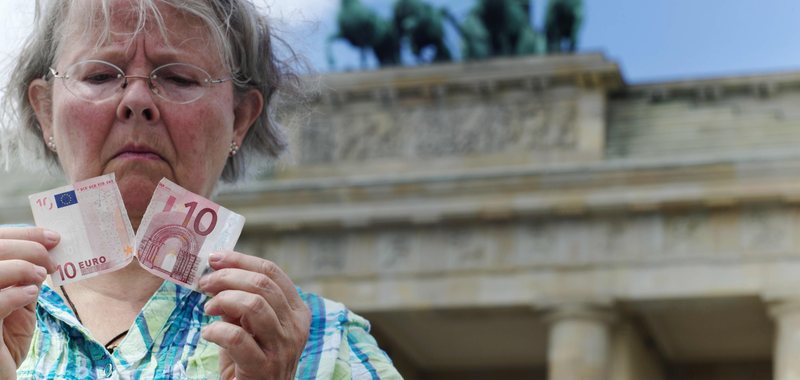Police salaries in Europe: Which countries pay officers the most and the least?

Police play a vital role in maintaining public order and ensuring the safety of citizens. To support these essential services, European governments allocate significant resources every year. In 2022, public spending on law and order across the European Union amounted to 1.7 percent of GDP. But how well are police officers compensated for their crucial work? How do police salaries compare across Europe?
Spain pays the least of Europe's Big Four
In 2023, police officers' gross monthly salaries ranged from 699 euros in Bulgaria to 5,761 euros in Denmark. These figures apply to a 35-year-old male police officer with over 10 years of experience, a low level of higher education and a 36-hour work week. In addition to Denmark, police officers' salaries exceeded 4,000 euros in three other countries. Germany, Luxembourg and Belgium followed Denmark with salaries of around 4,200 euros, while officers in the Netherlands earned 3,881 euros and those in Ireland 3,576 euros.
In France, a police officer meeting the above specifications earned €3,395, while in Italy, the figure was €2,537. Among the four major EU economies, Spanish police officers received the lowest salary at €2,271. Police officers earned less than €1,250 in five EU countries. Salaries were just under €1,250 in Hungary, Poland, Romania and Croatia, each above €1,050, while officers in Bulgaria earned the lowest, at just €699.
Luxembourg is the only country that pays women more
The gender pay gap remains a significant issue across Europe, and the police force is no exception. While data for some countries is unreliable, Luxembourg stands out as the only country where female police officers earn more than their male counterparts. In most EU countries, male officers earn over 10 percent more than their female colleagues. In 2022, one in five police officers in the EU was a woman. The chart above also highlights the salaries of female police officers.
Salaries of police inspectors and detectives
In many EU countries, the salaries of police inspectors and detectives are significantly higher than those of police officers, although the countries with the highest and lowest salaries remain the same. The salaries of police inspectors and detectives vary considerably across Europe, ranging from €1,316 per month in Bulgaria to €6,351 per month in Denmark. These figures represent the earnings of a 40-year-old male with over 15 years of experience, working a standard 36-hour week.
They also earned more than €5,000 per month in Ireland (€5,451), with Germany (€5,300) and Luxembourg (€5,243) close behind. Austria (€4,860), the Netherlands (€4,563) and Belgium (€4,144) also offered salaries above €4,000 for these roles. In addition to Bulgaria, police inspectors and detectives' salaries were below €2,000 in Latvia, Croatia, Lithuania, Romania, Poland and Hungary.
Among the EU's Big Four, Germany stood out as an outlier, with salaries above €5,000, compared to €3,763 in France, €2,878 in Italy and €2,456 in Spain.
Wages in purchasing power parity (PPP) provide a fairer comparison. The PPS is "an artificial currency unit" defined by Eurostat, where one PPS unit can theoretically buy the same amount of goods and services in any country. Purchasing power parity (PPP) "eliminates the effect of price level differences between countries".
Looking at police salaries in PPS, the disparities are smaller compared to nominal figures, but significant gaps persist across the EU. The salaries of police officers with low tertiary education, measured in PPS, ranged from 1,158 in Bulgaria to 4,397 in Denmark. The top and bottom places remain the same as in nominal figures.
Portugal ranked fourth from the bottom with a salary of 1,632 PPS. Among the 'Big Four', Spain had the lowest salary at 2,481 PPS. Denmark also topped the rankings for police inspectors and detectives' salaries, offering 4,848 PPS, followed by Germany and Ireland. In contrast, Bulgaria reported the lowest salaries in this category at 2,179 PPS, followed by Hungary (2,211 PPS) and Lithuania (2,248 PPS).
The gender pay gap, measured in PPS, remains a significant issue for police officers, inspectors and detectives. For women in these roles, the ranking changes little.

How could the European Central Bank react to Trump's trade tariffs?!
The European Central Bank (ECB) is bracing for renewed economic uncertainty as U.S. President Donald Trump prepares to impose a wide range of tariffs. On......

Insurance companies pay 1.2 billion lek in damages - AMF: About 1.28% less than in 2023. Most of it belongs to motor insurance
Claims paid by insurance companies have decreased. Around 1.2 billion lek is the amount of claims paid by insurance companies in January-February of this......

"VAT will be reduced to 15%" - Sali Berisha presents the "Made in Albania" program in detail
The leader of the Democratic Party, Sali Berisha, has presented in detail the "Made in Albania" program, which aims to promote production in Albania.......

Higher Education, 1 billion lek collected in 2024 - Instat: The number of registrations has decreased by 14% in 4 years
Even with a decrease in the number of students in the auditoriums of Albanian universities, data from the Ministry of Finance shows that during the past......

38 million euros for the purchase of energy - In the period January-March KESH conducts 10 tenders
3 tender procedures are carried out, the bill is estimated at around 11 million euros Around 38 million euros were spent in the first 3 months of the year......

The number of complaints about tenders at the Public Procurement Commission is increasing - How much money will be deposited in the state budget?
Complaints filed by Economic Operators against tender procedures with the Public Procurement Commission have been increasing. According to the February......

France, Le Pen found guilty of corruption - Far-right leader sentenced for embezzlement of EU funds
A French court has found far-right leader Marine Le Pen guilty of embezzling EU funds. The soon-to-be-expected sentence could bar her from running for......

Germany is losing over 10,000 workers per month - Industry plans to cut jobs by 44%
Unemployment in Germany is rising, and especially in industry, many companies are planning to cut jobs. New jobs are being created mainly in the service......


















